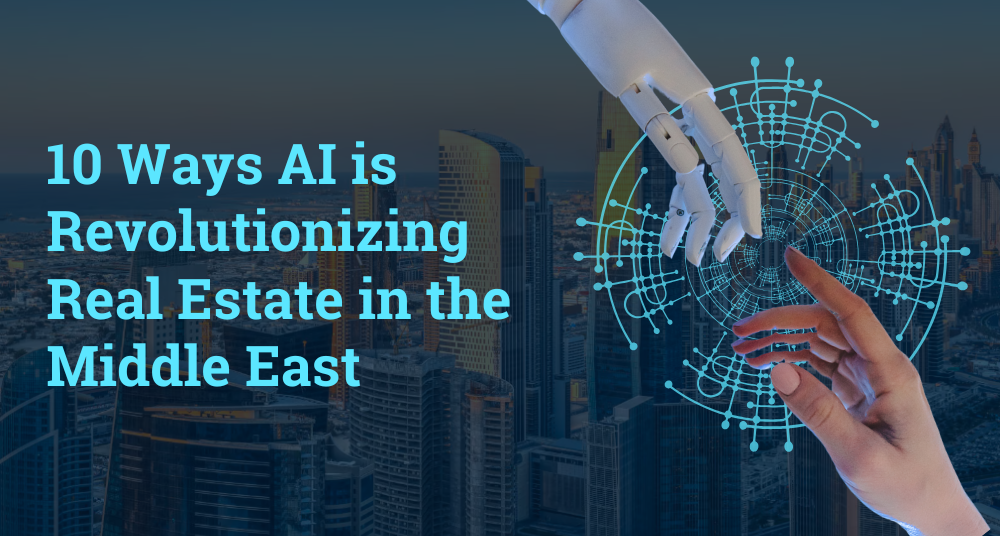The Middle East is experiencing one of the most dynamic real estate transformations in the world. Mega projects like NEOM in Saudi Arabia, Masdar City in Abu Dhabi, and Dubai’s AI-driven Smart City initiatives are reshaping how properties are built, bought, and managed. At the core of this rapid evolution lies Artificial Intelligence (AI) — now becoming a key pillar for property developers, investors, agents, city planners, and customers.
AI is no longer a futuristic concept in the real estate sector. From automated valuations and virtual property tours to predictive investment analytics and AI-powered smart city planning, the technology is unlocking unprecedented possibilities for the region’s real estate economy.
In this detailed guide, we’ll explore the top 10 ways AI is transforming the real estate industry in the Middle East, backed by use cases, insights, and technological trends shaping the future.
Overview: Real Estate Growth in the Middle East
The Middle East’s real estate sector has undergone significant growth, driven by:
- Population expansion
- Government-backed smart city projects
- Increased foreign investment
- Rise in digital transformation
- A shift toward diversified economies (beyond oil)
Countries like UAE, Saudi Arabia, Qatar, and Bahrain are leading the charge. With rising demand for high-quality real estate — residential, commercial, industrial, hospitality — AI is becoming the backbone of new-age property innovation.
10 Ways AI Is Revolutionizing Real Estate in the Middle East
AI-Powered Property Valuation Models
Property valuation in the Middle East has traditionally relied on human appraisers, market sentiment, and historical comparables. These methods, while useful, are often susceptible to inaccuracies and inconsistencies. AI-powered valuation models bring much-needed precision by analyzing hundreds of variables instantly.
Machine learning models can evaluate:
- Location desirability
- Historical price trends
- Local infrastructure development
- Market seasonality
- Supply and demand ratios
- Nearby amenities
- Traffic and accessibility patterns
- Economic indicators
- Social media sentiment
In markets like Dubai and Riyadh, where rapid development constantly reshapes neighborhoods, AI models provide real-time, data-backed valuations. This reduces human bias, improves transparency, and supports both buyers and sellers in making informed decisions. Real estate platforms integrated with AI valuation engines enable instant property appraisals, speeding up transactions and increasing market trust.
Predictive Analytics for Investment Decisions
Investment in Middle Eastern real estate has grown exponentially due to large-scale infrastructure projects, economic diversification, and expanding expatriate populations. Predictive analytics—powered by machine learning—helps investors identify opportunities with high potential returns.
AI algorithms can forecast:
- Future price appreciation
- Rental yield trends
- Emerging high-growth neighborhoods
- Potential risk factors
- Market cycles and demand shifts
- Effects of upcoming government policies
For instance, an investor can use AI-based tools to analyze how a new metro line in Riyadh or Dubai might influence future property values within specific radii. Such insights were nearly impossible to obtain manually.
Moreover, AI helps institutional investors build optimized portfolios by simulating market scenarios and assessing long-term profitability. By forecasting market fluctuations, AI reduces investment risk and enhances strategic decision-making.
Smart Cities and AI-Enabled Urban Planning
The Middle East is home to some of the most ambitious smart city projects globally, including NEOM in Saudi Arabia, Lusail City in Qatar, Masdar City in Abu Dhabi, and the Dubai Smart City initiative. AI plays a critical role in shaping these futuristic cities.
AI is being used to:
- Analyze population growth and migration trends
- Optimize traffic and mobility flows
- Predict infrastructure demands
- Plan energy-efficient buildings
- Improve waste management
- Enhance public safety systems
- Model future urban expansion
Urban planners use digital twins—virtual city replicas enriched with live data—to simulate urban development and environmental impact. These simulations enable policymakers and developers to make informed decisions long before construction begins.
AI also ensures that buildings and neighborhoods interact harmoniously with surrounding infrastructure, creating cities that are not only technologically advanced but also sustainable, livable, and resilient.
Intelligent Property Management Systems
The Middle East’s real estate market includes large portfolios of commercial, residential, hospitality, and mixed-use properties. Managing these assets manually is time-consuming and inefficient. AI-powered property management systems automate essential workflows and provide real-time insights.
AI enhances property management through:
- Automated maintenance scheduling
- Predictive equipment failure alerts
- Tenant behavior analysis
- Rental payment automation
- Smart energy optimization
- AI-enabled security monitoring
- Efficient communication between tenants and management
For example, AI can predict when HVAC systems in Abu Dhabi towers might fail based on temperature patterns, energy consumption, and historical performance. This minimizes downtime, reduces repair costs, and boosts tenant satisfaction.
In addition, AI-powered chatbots allow tenants to request maintenance, renew contracts, or inquire about services anytime, enhancing communication and building stronger tenant relationships.
AI-Driven Customer Experience in Real Estate Services
Customer expectations in the Middle East’s real estate sector have evolved significantly. Modern buyers and tenants want digital-first experiences, convenience, and immediate support. AI enhances the customer journey from the moment they start searching for property until the closing process.
AI applications include:
- Personalized property recommendations
- Automated customer support
- Mortgage eligibility estimation
- Instant document verification
- Virtual property tours with AI-guided narration
- Real-time Q&A via chatbots
AI helps real estate companies create unique customer journeys tailored to individual needs. For example, a buyer searching for a villa in Dubai with a specific budget, lifestyle preference, and family size receives curated suggestions that match their criteria—often more accurately than a human agent could provide.
This level of personalization builds trust, accelerates decision-making, and enhances customer retention.
Virtual Agents and Automated Lead Generation
Real estate companies receive thousands of inquiries daily, and manually managing these leads can be inefficient. AI-powered virtual agents help automate the lead management process, ensuring faster responses and higher conversion rates.
Virtual agents can:
- Answer customer questions 24/7
- Qualify leads automatically
- Schedule viewings
- Match clients with appropriate agents
- Track client behavior on websites and apps
AI analyzes user interactions to determine lead intent and readiness. For example, a user who repeatedly searches for apartments in Doha and saves listings is identified as a high-intent lead. An AI system can immediately alert sales agents to prioritize this inquiry.
Automation not only improves response times but also enhances operational efficiency, allowing human agents to focus on negotiations and relationship-building instead of administrative tasks.
AI in Construction and Development Optimization
The construction sector is the backbone of real estate development in the Middle East. AI is transforming this sector by improving planning accuracy, reducing delays, and enhancing safety.
AI-driven tools help with:
- Construction timeline forecasting
- Automated design optimization
- Cost estimation and budget control
- Supply chain management
- Safety monitoring using computer vision
- Quality assurance and defect detection
- Site surveillance and worker safety compliance
Computer-vision cameras, for example, can detect unsafe working conditions in real time and alert supervisors instantly, reducing accidents significantly.
AI also optimizes architectural design by analyzing environmental factors such as heat, wind direction, and solar exposure—important considerations in Middle Eastern climates. This results in buildings that are more energy-efficient and sustainable.
Enhanced Security and Access Control Through AI
Security is a major priority in luxury residential and commercial developments across the Middle East. AI enhances security through advanced surveillance, automated access control, and threat detection systems.
AI technologies include:
- Facial recognition for gated communities
- License plate recognition for parking facilities
- Smart visitor management systems
- Behavior-based intrusion detection
- Real-time threat analytics
- Automatic emergency alerts
In cities like Dubai and Riyadh, high-end properties integrate AI-based surveillance that distinguishes between residents, visitors, and unauthorized individuals. These systems improve safety while streamlining access, creating a seamless and secure environment for occupants.
Personalized Real Estate Search Engines
Traditional real estate websites often display generic search results. AI transforms this experience by analyzing user behavior, preferences, and lifestyle needs to deliver deeply personalized property matches.
AI considers factors such as:
- Budget and income
- Lifestyle preferences
- Commute times to work
- School proximity
- Community facilities
- Previous search behavior
- Social media activity (where applicable)
For example, a family searching for a property in Sharjah may be shown homes near reputable schools, parks, and family-friendly facilities. A young professional in Dubai Marina might receive suggestions for apartments with co-working spaces and gyms.
This level of customization improves user satisfaction and increases the efficiency of real estate platforms.
Sustainability and Energy Optimization Through AI
Sustainability is becoming essential in Middle Eastern real estate, driven by national strategies aimed at energy efficiency and environmental resilience. AI plays a crucial role in achieving sustainability goals across buildings and communities.
AI systems help:
- Reduce energy consumption
- Optimize HVAC operations
- Implement smart climate-control strategies
- Monitor water usage
- Detect leaks in real time
- Adjust lighting based on occupancy
- Predict environmental impact
Smart buildings equipped with AI can reduce energy usage by up to 30–40%, significantly lowering operational costs. In hot climates, AI-powered cooling systems ensure energy is used efficiently, balancing comfort with sustainability.
AI also supports green certifications by providing detailed environmental analytics that developers can use to meet LEED or Estidama standards.
Final Words
Artificial Intelligence is rapidly transforming the real estate industry in the Middle East, reshaping how properties are bought, sold, built, and managed. From AI-powered property valuation and predictive investment insights to virtual tours, automated maintenance, and smarter lead generation, the technology is driving higher efficiency, better customer experiences, and stronger ROI for developers and investors. As mega projects like NEOM, Masdar City, and Dubai’s Smart City vision continue to grow, AI will play a central role in building sustainable, data-driven urban environments.
While challenges such as implementation costs, data privacy, and skill gaps remain, the benefits of AI adoption far outweigh the limitations. The future of Middle Eastern real estate will be more intelligent, transparent, energy-efficient, and customer-centric — powered by AI technologies that enable smarter decision-making. Companies that embrace AI today will shape the next generation of real estate innovation in the region.
Related Blog: Successful Business Ideas in UAE






What do you think?
It is nice to know your opinion. Leave a comment.